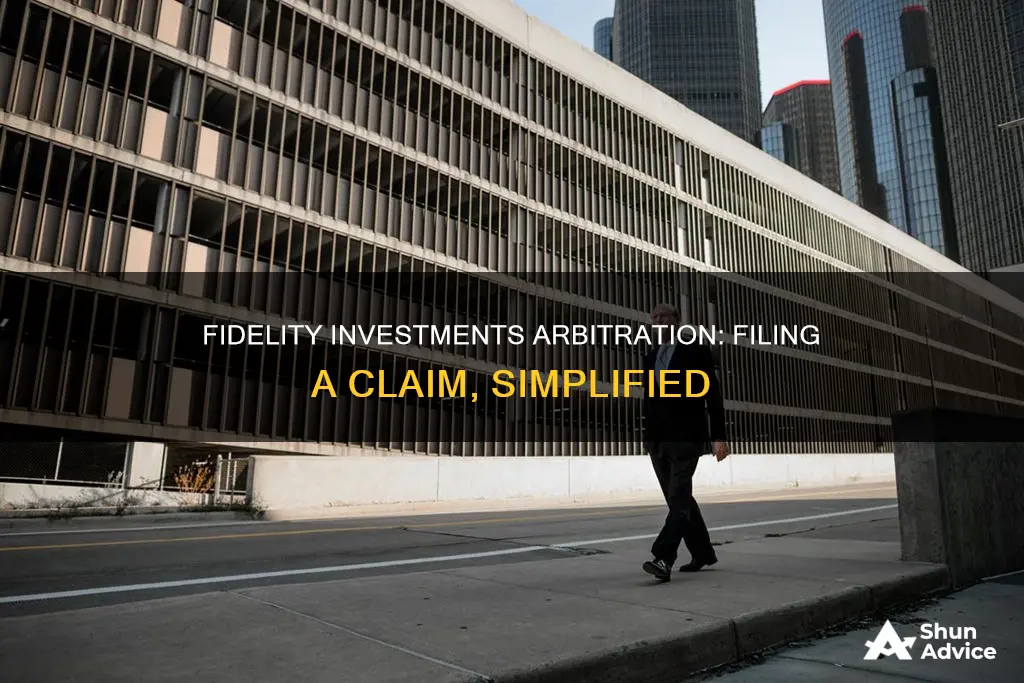
If you want to file a Fidelity Investments arbitration claim, you can start by checking your contract or user agreement with them. Many companies make their standard contracts available on their websites, so you can search for the word arbitration within the contract text to see if it applies to your situation. If you decide to pursue arbitration, you can file a claim through the Financial Industry Regulatory Authority (FINRA) Dispute Resolution Portal. This process is similar to going to court but is usually faster, cheaper, and less complex. You will need to submit a Statement of Claim, which includes the names of the claimant(s) and respondent(s), details of the dispute, and the type of relief requested. You will also need to sign and submit FINRA's Submission Agreement, which acknowledges your understanding and acceptance of their rules and the arbitrator(s)' decision. A filing fee is required, and it is based on the total amount of your claim.
| Characteristics | Values |
|---|---|
| First step | Submit the following to FINRA: Submission Agreement, FINRA's Arbitration process, Statement of Claim, and Submission Agreement |
| Statement of Claim | A document that provides the name(s) of the claimant(s), respondent(s), details of the dispute, and type of relief requested |
| Submission Agreement | A form that must be signed and dated to acknowledge that you understand FINRA's rules and will abide by the arbitrator(s)' decision |
| Filing fee | Based on the total amount of your claim; refer to FINRA Rule 12900 for the fee schedule |
| How to submit the arbitration claim | File the claim via the DR Portal or by mail if representing yourself |
| Consumer Arbitration | Official and independent dispute resolution process that does not require in-person appearance |
| Small Claims Court | Involves appearing in person and completing necessary forms; procedures may vary depending on jurisdiction |
| Maximum dollar amount for a small claims court case | Varies by state, typically $5,000 or $10,000, but can be as low as $2,500 in Kentucky and Rhode Island |
What You'll Learn

Check your contract for the arbitration clause
When filing a Fidelity Investments arbitration claim, it is important to check your contract for the arbitration clause. This is because arbitration clauses outline the rules and procedures for resolving disputes.
A well-written dispute resolution clause is the foundation of an effective dispute resolution process. It should be noted that arbitration is an out-of-court proceeding where a neutral third party, the arbitrator, hears evidence in a dispute and then makes a binding decision. Arbitration is usually faster, simpler, more efficient, and more flexible for scheduling than litigation. It is also a private proceeding, which can reduce the hostility that may be present in a public courtroom dispute.
In the context of your Fidelity Investments contract, the arbitration clause will specify the level of expertise required of the arbitrator. For example, if your claim is related to a patent, you may want to include a condition that the arbitrator must be a patent expert or attorney. Additionally, the clause may designate a specific arbitration agency to handle the arbitration, such as the American Arbitration Association or the National Arbitration Forum.
Furthermore, the arbitration clause will outline the rules for the arbitration proceeding. These rules can be vague, simply stating that the arbitration must take place at an agreed-upon location and be conducted by an agreed-upon arbitrator. Alternatively, the rules can be more specific, such as specifying the state in which the arbitration must take place.
Reviewing the arbitration clause in your contract will help you understand the process, requirements, and expectations of the arbitration proceeding. It is always recommended to consult with an attorney before entering into any contractual agreement or dispute resolution process.
Lump Sum Investing: Choosing the Right Fund for You
You may want to see also

File a complaint through FINRA
If you believe that a salesperson, brokerage firm, or other industry professional has treated you unfairly, you should first contact the firm to see if you can resolve the issue. If you are not satisfied with the firm's response, you can file a complaint with FINRA.
FINRA investigates complaints against brokerage firms and their employees and can take disciplinary action against brokers and firms who violate the rules. Sanctions may include fines, suspensions, barring from the securities industry, or other appropriate sanctions.
Before filing a complaint with FINRA, you should:
- Immediately question your broker about any transaction that you do not understand or did not authorize.
- If you are not satisfied with your broker's response, contact the firm's branch manager or compliance department.
- If you lost money or there was an unauthorized trade made in your account, you should complain in writing. Retain copies of your letter and all other related correspondence with the brokerage firm.
- If you are still not satisfied with the firm's response, you can send a complaint to FINRA.
FINRA offers a Complaint Program through which you can file your complaint. You can also use FINRA's online form to report any potentially fraudulent or suspicious activities by brokerage firms or brokers.
FINRA also operates the largest securities dispute resolution forum in the United States, providing a fair, efficient, and effective venue to handle securities-related disputes through arbitration and mediation.
Index Funds: Regular Investing for Long-Term Success
You may want to see also

Understand the differences between arbitration and mediation
Arbitration and mediation are both means of resolving conflicts or legal issues outside of the courtroom, known as alternative dispute resolution. They are both used to help two parties reach an agreement without a lengthy legal battle. However, there are some key differences between the two.
Mediation is a non-binding process that involves a neutral third party, called a mediator, who helps the other two parties resolve their issues collaboratively. Mediators are trained and qualified with conflict resolution skills and legal knowledge, but they do not have the power to make a final decision. This is left to the two arguing parties, who must voluntarily agree to a resolution. Mediation is generally cheaper and less cumbersome than litigation, and it gives disputants the freedom to solve their issues largely on their own.
On the other hand, arbitration grants an arbitrator, or a panel of arbitrators, the authority to make a final decision about the issue. The process is more structured and similar to a court case, with each party making an opening statement and presenting their side. The arbitrator(s) will then consider both sides and come to a conclusion. Arbitration is usually faster, cheaper, and less complex than litigation, and it can help to reach a definitive outcome.
In summary, the main distinction between mediation and arbitration is who makes the final decision. Mediation is a collaborative process that allows the disputing parties to reach their own agreement, while arbitration involves an arbitrator making a binding decision.
Life Insurance Funds: A Smart Investment Guide
You may want to see also

Send a demand letter to Fidelity
To initiate a claim against Fidelity, you must first send them a demand letter. This is a simple and straightforward letter that outlines who you are, what the problem is, and what you want from them. Include your name, address, phone number, and account number. The whole letter can be just a few sentences.
When you have finished writing the demand letter, you need to mail a hard copy of the letter to Fidelity's legal address. It is recommended to use a service that allows you to confirm delivery, such as certified mail. According to recent research, the legal address of Fidelity is:
> Fidelity Brokerage Services LLC C/O THE CORPORATION TRUST COMPANY CORPORATION TRUST CENTER 1209 ORANGE ST WILMINGTON, DE 19801
However, it is advised to check your contract to confirm if this is the correct address for legal notices.
If you are unsure about the content of your demand letter, you can find examples and a guide on how to write one effectively. This will help ensure that your letter includes all the necessary information and is structured appropriately.
It is important to note that before filing a claim in small claims court, most courts require that you first attempt to resolve the issue directly with the company. Sending a demand letter is a crucial step in this process, demonstrating your effort to address the matter voluntarily before taking legal action.
Tips Mutual Funds: When to Invest for Maximum Returns
You may want to see also

Fill out court forms
To file a claim against Fidelity, you will need to fill out some court forms. Each state has its own set of forms that need to be completed to file a claim, and sometimes counties will require additional forms. These forms are typically available for free on your state court website. Make sure you fill out enough forms, as most states that require you to file forms by mail or in person will ask for 3 or 4 copies. If you don't have the correct number of copies, your claim will not be accepted.
The forms will require basic information such as your name, address, phone number, and account number. You will also need to provide details of the dispute and the type of relief requested, such as actual monetary damages, interest, or specific performance. It is important to provide any documents that support your claim and to be as detailed as possible.
In addition to the court forms, you may also need to submit a Statement of Claim and a Submission Agreement to FINRA (Financial Industry Regulatory Authority). The Statement of Claim should include the name(s) of the claimant(s) and respondent(s), details of the dispute, and the type of relief requested. The Submission Agreement is a form that must be signed and dated to acknowledge that you understand FINRA's rules and will abide by the arbitrator(s)' decision.
Litigation Funding Investment: How Does It Work?
You may want to see also
Frequently asked questions
The first step is to submit a Statement of Claim to the Financial Industry Regulatory Authority (FINRA). This document should include the name(s) of the claimant(s), respondent(s), details of the dispute, and the type of relief requested.
After submitting the Statement of Claim, you need to submit a Submission Agreement to FINRA. This form acknowledges that you understand and agree to abide by FINRA's rules and the arbitrator(s)' decision.
FINRA requires investors and other parties to file their arbitration claims through the DR Portal. However, investors representing themselves have the option to file by mail.







